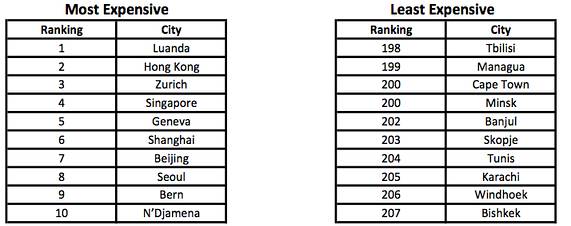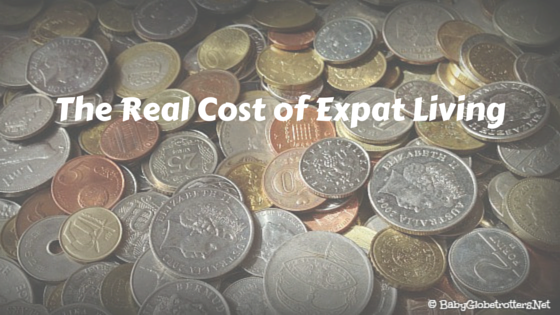The Mercer cost of living results for 2015 have been released today; but what do cost of living survey’s really mean for expat families? Let’s explore…
As I pointed out in my last cost of living article in November, it is extremely important to read between the lines when reviewing cost of living surveys and what it means to you when evaluating an expat posting offer, especially when family is involved.
The Mercer survey compares prices across a basket of goods, indexed back to the USD and New York used as the baseline city. Included in their basket is housing, transport, food, education and entertainment. Compared to other cost of living monitoring services such as those provided by the Economic Intelligence Unit and ECA International, I believe the Mercer basket to be the most all-encompassing, but a big component which can be a little distorting, is housing. Housing is frequently treated separately to an expats salary and reward package due to the fact it is either provided for you, or paid as a separate allowance.
Ultimately, these surveys are designed to assist employers and employees negotiate sensible salary packages and should form but one element of the overall decision to move. Consider not just what costs need to be covered, but quality of living and the opportunities the job and the city themselves presents to you and your family.
Some crucial questions to ask yourself include:
- Will there be schooling options available, at both primary and secondary level suitable to my children’s needs?
- Will I have access to products and brands that we consider essential for our living?
- Will there be appropriate health facilities and insurance to cover our basic needs and emergencies?
- Are there social groups and opportunities, such as playgroups for small children, after school activities and sporting clubs, cinemas?
- Are there security concerns? Will my family be able to move about the city safely and freely? (you may want to refer to our Safest Cities article addressing these concerns).
- Is housing in appropriate areas for expats readily available or will compromises be needed on size, location, facilities?
- Are there traffic and commuting concerns? With the housing you can afford, can both the worker and family at home easily get from A to B with public transport and/or private vehicles?
- Will there be any cultural integration and support provided?
- Can the spouse also get a working Visa and enter the workforce?
- Will the working partner be able to progress in their role and receive the right training, support and opportunities for future pay rises?
- Will we get relocation and annual fly-home allowances (and enough annual leave to take advantage of this)?
- Are any end of service benefits accruing?
Come check out our Expat Remuneration Packages article for more details on what you should be looking to negotiate into a family-friendly package.
Heading back to the Mercer survey results for 2015, a lot of the names appearing in among the top 10 come as no surprise. Swiss cities as always make several appearances, not helped by the strong Swiss Franc. Likewise, Hong Kong and Singapore, a couple of the usual culprits pop in there – largely due to their expensive housing – and a new entrant to the top 10, Seoul. 
Once again heading the Mercer league table is Luanda, capital of oil-rich Angola. A report in Wall Street Journal last month highlighted expat living problems at their extreme where day to day groceries from an expatriate supermarket easily cost up to five times their normal price – even a lady buying a melon for $100. Yes, a piece of fruit. (Master L you will have to seriously change your diet if we ever move to Luanda).
If your city is sitting at the bottom of the table, this doesn’t necessarily mean your salary will be set significantly lower, other factors such as danger money or hazard pay could also come in to play as part of your overall compensation package.
For my readers in the UAE, the cities of Dubai & Abu Dhabi have both significantly jumped up the league tables this year, now coming in at 23 and 33 respectively overall, compared to 67 and 68 in 2014. The report attributes this to increased housing costs – which I can certainly attest to! The most expensive city in the Middle East however, is Tel Aviv.
So do you think the Mercer survey is an accurate reflection of your cost of living? Are their any daily costs in your city that still really surprise you?
© BabyGlobetrotters.Net
(League table taken from Wall Street Journal – Expat)
Categories: Expatriate Life











